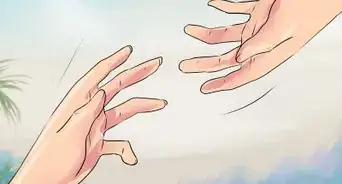This article was co-authored by Seth Hall. Seth T. Hall is a Certified Life Coach and Founder of Transformational Solutions, a Los Angeles-based life-coaching company that helps people achieve their toughest goals, find their own voice, and think outside the box. He has been a life coach for over 10 years, specializing in personal development, relationships, career and finance, and wellness. He has helped his clients break the negative cycles in their lives and replace them with a positive, proactive mindset. Seth believes that everyone has the potential to live a fulfilling and rewarding life, and works passionately to help them reach their full potential. With a deep understanding of how our minds work and the power of positive thinking, he encourages his clients to find their unique paths in life and find success on their own terms. He is a certified master practitioner of Neuro-Linguistic Programming, a featured co-author for WikiHow, and co-author of "The Mountain Method”, “The Happy Tiger”, and “The V.I.S.I.O.N.S. Program”.
wikiHow marks an article as reader-approved once it receives enough positive feedback. In this case, 100% of readers who voted found the article helpful, earning it our reader-approved status.
This article has been viewed 327,921 times.
Being indifferent means being dispassionate about the things that happen around you. Instead of being caught up in drama and emotion, enjoy the show! People all around you are getting involved in their own production -- how great it would be to sit back and watch, carefree. It's mind over matter, truly.
Steps
Thinking Indifferently
-
1Get away from your self. Yep, that's two separate words. There are several "you"s that exist simultaneously. Sort of like Freud's id, ego, and superego. There's the "you" that behaves, for starters. Then, there's a "you" that monitors that behavior (your highly evolved one, you). And then there's actually a part of you that can step outside and look at things from another perspective entirely -- it's this last one you need to get at to become indifferent. If that's a little confusing, let's put it this way:[1]
- There's the you that just does and is. It's like the baby within you -- this is the first "you." You eat, you breathe, you do human things. You don't really question it. It's the you just reading right now.
- Then there's the "you" that is monitoring all this behavior, thinking, making sure it's socially acceptable, making sure you survive, etc. Ever thought to yourself, "My God, why did I eat 5 slices of pizza?!" That's the second you.
- This third "you" is a bit more elusive. It can look at your behavior and thoughts and come to highly-evolved, self-aware conclusions. This is the "you" we'll be targeting. This you doesn't really feel things or need things -- it just observes. It's indifferent.
-
2Think of life like a movie. In order to target this third you, you need to think of life like a movie. That is, you need to be a little less invested in what's going on. Emotions don't really have a place -- or if they do, they only skim the surface and don't have any real repercussions. What kind of movie are you in right now? Who's in control? What's probably going to happen?
- If you get this thinking down, you'll start seeing patterns and thinking outside of the box -- less selfishly, more big picture. For example, right now you're sitting at home, eating a bowl of cereal, surfing wikiHow. What's your character feeling and why? How might that change in the coming days? Watching an emotion, seeing that it's there, is a lot different than feeling it.
Advertisement -
3Know that it's no big deal. Whatever it is. Seriously. It is no big deal. In the grand scheme of things, few things are. Maybe the eventual collapse of the universe? That seems pretty huge. But that zit in the middle of your forehead? That comment Trang made that may or may not have been malicious? Nope and nope. Why should these tiny things get any reaction or emotion of out you?
- When nothing is a big deal, it's hard to be phased. However, it's hard to get happy too. Know that this is a give and take. In a recent study, those who believed that they had no purpose in life but didn't really care, are middle-of-the-road when it comes to happiness.[2] So while you won't care that your stupid scum of a boyfriend dumped you, you also won't feel super ecstatic when you get that job promotion...because it's all no biggie.
-
4Open your mind. Being indifferent is about leaving our assumptions, our beliefs, our pride, our emotions and our vulnerabilities at the door. In order to do so, our minds have to be entirely open. Is some lunatic raving about how your sexual orientation/gender/denomination/race is all going to hell? Hmm. Interesting. Wonder why he thinks that? Any reaction on your part should be merely intrigued -- never offended, angry, or defensive.[3]
- Staying rational and logical is a huge hurdle for many of us. When someone personally says something that attacks our belief system, we naturally want to speak up and put that person in their place. Can't do that! You have to keep an open mind and get unattached to your opinions on the matter. So this person thinks something different from you -- good for them!
-
5Think of the process behind the content. Whenever you're interacting with others, think of them as their characters. Think of their background and why it is they're saying what they're saying and doing what they're doing. And when it comes to their words, what do they actually mean? In other words, think of the process behind the content.
- When someone says, "Hey, ohmigosh, I really have something I want to tell you -- but I totally shouldn't," they're actually saying, "Please give me attention. I have some gossip and it would give me immense satisfaction if you begged for it." The process (what they actually mean to say) is still going on behind the content (what actually came out of their mouths). Seeing behaviors for the process makes it a lot easier to address what's actually going on (and to remove yourself from the situation at hand).
Appearing Indifferent
-
1Keep your facial expressions to a minimum. Being indifferent is all appearing as if you don't care one way or another. To keep up that impression, it's important not to give away your feelings on your face. If your words are, "Oh, that's slightly interesting," you won't look indifferent with raised eyebrows, eyes aghast, and mouth hanging open.
- It's not about reacting negatively or positively or even not reacting. You're still present; you're still an alive human being. It's just about hearing or seeing something and taking it in calmly and definitely not taking it personally. Sort of like every reaction you have when your little sister's friend starts talking about her potato chip addiction. Mild curiosity at best.
-
2Don't let your body give you away. So you've got the facial expressions down -- now it's time to make sure your body matches what your face is saying. Turns out most of body language is just that -- the body. Even if your words and your face scream "I couldn't care less" but your body makes it clear you're uncomfortable, you're no longer indifferent.[4]
- You should have a relaxed, open position at all times. Like you're watching a decent movie. You're still engaged, but you're comfortable and stress-free. And if you're trying to convince your crush you're indifferent, hanging on them is not the way to mask your body language!
-
3Stay open and receptive. Too much of indifference can easily be mistaken for aloofness, being cold, or being just plain negative. That's not what indifference is about! You're still open, welcoming, and receptive -- it's just that you don't care whether people come to you to be welcomed or not. You'll do your thing regardless -- in fact, if no one were in the room, you'd be behaving the same way.[5]
- Because you're an observer, you have no reason to close yourself off. Even if your significant other is yelling at you, keep your arms uncrossed and your legs unfolded. This is just a display of their need to control and you'll address it when you can get a word in edgewise calmly. You're still hearing what they have to say, you're just hearing all the levels to it and putting it through an objective analysis.
-
4Don't enjoy it too much. Some of us want to be indifferent to achieve some sort of self-satisfaction. We want to get back at an ex, prove to our boss/parents/siblings just how much we don't care, etc. If this is your case, don't enjoy it too much! That will give it away that your indifference is a facade , a show. You're no longer indifferent; you've become a phony.
Acting Indifferent
-
1Be calm. Since everything is no big deal and you're analyzing the process from afar anyway, why in the world would you be anything but calm? You have nothing to lose in 99% of life's situations when it boils down to it, so why waste your energy?[6]
- Lots of people get stressed out during life's situations -- whether it's meeting a deadline, a fight with a boyfriend or girlfriend, or drama between friends. It's because they care about the outcome -- something you don't do. So the next time you find yourself in a stressful situation, think nothing of it. It'll pass soon enough anyway.
-
2Be stoic. In addition to staying calm, it's important to be stoic (showing little emotion). You're not only stress-free since '93, but you're also never angry, sad, or overly happy. The situations around you don't phase you much, so you don't have much reason to feel intense emotion.
- Whether it's "You killed my fish!" or "I'm dumping you" or "Justin Bieber totally called me last night," your reaction should be as if someone said, "I bought a new lamp today." That's nice and all. Maybe you want to know what color it is, maybe you don't. You'll ask if you feel like it.
- To be stoic, remember that there are certain things that are in your control. And there are things that are not in your control. That will allow for a form of neutrality, so that you are able to hear the other person and what they're saying without reacting.
-
3Be objective. The world is full of opinions. Everybody has 'em. And most people display them quite readily. You, on the other hand, aren't most people. You see both sides of the coin and analyze situations for what they are -- not seen through a cloud of emotion.
- That means seeing your side of the coin, too. Sometimes it's hard to see the forest through the trees, but with practice being aware of your own behavior is possible. So when you're fighting with a friend, see what's driving her, but also see what's driving you.
-
4Address the process. When you're dealing with people, you don't necessarily have to respond to their words. You need to respond to what they're actually saying. Ignore the content and rely on the process. It'll help you be objective and removed from the emotions swirling around you. Instead, you'll be thinking about people's predispositions, tendencies, and complexes -- pretty neutral territory.
- Let's say Julia brought Pete, her husband, a list of things to do. Pete doesn't do it and Julia gets upset. Pete starts thinking Julia is a big nag and Julia thinks Pete doesn't care about her and is lazy. Instead, Pete should be thinking about how that list is really Julia needing her life to be organized and her asking for his help to do this -- Julia needs to realize her own translation of Pete's behavior and that is has nothing to do with her -- it's just that Pete operates on a different wavelength. When they see themselves for how they're acting, they remove themselves from the situation and can solve it.
-
5Give the common courtesy you give to strangers to all. If you're truly indifferent, you don't prefer one person over another. Again, it's like you're alone in the room. If there's a specific someone you want to convince of your indifference, treat them like you would a stranger. You'd definitely be civil, you'd definitely respond if they talked to you and you'd make chit chat, but when they walk away that's all it was. And that's totally fine.
- This works on enemies, too. Even if you hate the person, indifference is more powerful. They'll be expecting you to react -- when you don't, they won't know what to do. So be civil to them and kill 'em with indifferent kindness.
Warnings
- In any case, introspection is the key to accepting things.⧼thumbs_response⧽
- These thoughts only work if you truly believe in them.⧼thumbs_response⧽
References
- ↑ https://www.psychologytoday.com/us/blog/rejoining-joy/201103/the-multiple-parts-the-self
- ↑ http://www.theguardian.com/lifeandstyle/2011/apr/02/change-your-life-existential-indifference
- ↑ https://simplifyyourday.com/the-power-of-keeping-an-open-mind/
- ↑ https://www.psychologytoday.com/us/blog/fulfillment-any-age/201703/does-your-body-language-give-you-away
- ↑ https://www.globallisteningcentre.org/body-language-of-listeners/
- ↑ https://www.psychologytoday.com/us/blog/the-creativity-cure/201402/how-be-calm-person
About This Article
Being indifferent is all about responding dispassionately to what goes on around you and not getting emotionally involved. To appear indifferent, keep your facial expressions to a minimum, since you don’t want to indicate you have any strong feelings. Stick to a relaxed posture with your arms open and relaxed to show that you’re calm while being open to interaction with others. Speak calmly and avoid responding emotionally to anything that is said. When you talk about a disagreement, try to analyze both sides as if you’re an external observer, which will show you’re not caught up in it. For tips on how to be indifferent by thinking of your life as a movie, keep reading!












































































